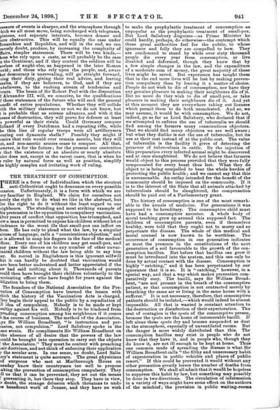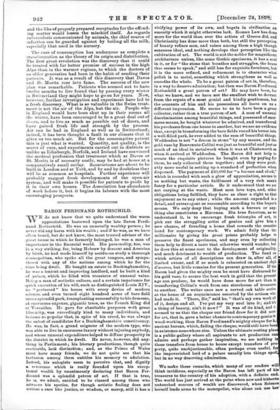THE TREATMENT OF CONSUMPTION. r HERE is a form of Individualism
which the stoutest anti-Collectivist ought to denounce on every possible iceasion. Unfortunately, it is a form with which we are rery familiar in England. We claim for ourselves not nerely the right to do what we like in the abstract, but Ise the right to do it without the least regard to our teighbours. The standing and most striking example of his pretension is the opposition to compulsory vaccination. Iter years of conflict that opposition has triumphed, and low a man is permitted to expose his children without let or lindrance to the worst ills that small-pox can inflict on hem. He has only to plead what the law, by a singular aisuse of language, calls a "conscientious objection," and ie is allowed to snap his fingers in the face of the medical ■ fficer. Every one of his children may get small-pox, and nay pass the disease on to any number of other uuvac- Mated children without the law being able to say him tay. So rooted in Englishmen is this ignorant self will hat it can hardly be doubted that vaccination would tave been better understood and better appreciated if the aw had said nothing about it. Thousands of parents muld then have brought their children voluntarily to the 'accinating officer who have fought for years against the ,bligation to bring them.
The founders of the National Association for the Pre- 'ention of Consumption have learned the lesson with rhich the history of the Vaccination Acts is charged. ley begin their appeal to the public by a repudiation of 11 idea of compulsion. Nobody is to be made or kept iealthy against his will. Nobody is to be hindered from preading consumption among his neighbours if it comes ate course of business. The method of the Association, yris Sir William Broadbent, "is instruction and per- iasion, not compulsion." Lord Salisbury spoke in the tine strain. He compliments Sir William Broadbent on the absence of all desire that the powers of the law sould be brought into operation to carry out the objects the Association." They must be content with preaching ieir doctrines, and not think of enforcing their application 7 the secular arm. In one sense, no doubt, Lord Salis- ury's statement is quite accurate. The great physicians id surgeons who met at Marlborough House on uesday know their countrymen too well to propose taking the prevention of consumption compulsory. They al us that it can be prevented, they set out the means E preventing it, but there they stop. They have in view, D doubt, the strange delusion which threatens to undo ke beneficent work of Jenner, and they have no wish to make the prophylactic treatment of consumption as unpopular as the prophylactic treatment of small-pox. But Lord Salisbury disguises—as Prime Minister he could hardly, perhaps, do otherwise—the contempt which these great authorities feel for the public, to whose ignorance and folly they are compelled to bow. They are condemned to stand by while over sixty thousand people die every year from consumption, or live disabled and deformed, though they know that by a few simple changes in the law, and the expenditure of a moderate sum of money, the great majority of these lives might be saved. But experience has taught them that in the end more lives will be lost by making preven- tion compulsory than by leaving it a matter of choice. People do not wish to die of consumption, nor have they any genuine pleasure in making their neighbours die of it. But no more do they wish to die of small-pox, or take pleasure in making their neighbours die of it. And yet at this moment they are everywhere taking out licenses which permit them to do both unmolested. And so, we may assume, it would be with consumption. We do not, indeed, go so far as Lord Salisbury, who declared that if we attempted to enforce the use of tuberculin we should find among the farmers many conscientious objectors. Thatwe should find many objectors we are well aware ; but what they dislike is not the use of tuberculin, but its use at their cost instead of at the public cost. The value of tuberculin is the facility it gives of detecting the presence of tuberculosis in cattle. By the injection of this preparation every infected animal might be discovered and at once slaughtered. We do not believe that farmers would object to this process provided that they were fully compensated for every beast thus lost. What they do object to is being compelled to bear the whole burden of protecting the public health ; and we cannot say that this is unreasonable. An outlay intended for the benefit of the community should be imposed on the community. If it is to the interest of the State that all animals attacked by tuberculosis should be slaughtered, the compensation should be paid out of a Parliamentary grant.
The history of consumption is one of the most remark- able in the annals of medicine. For generations it was supposed to be hereditary. The consumptive child must have had a consumptive ancestor. A whole body of moral teaching grew up around this supposed fact. The children of consumptive parents, even if themselves healthy, were told that they ought not to marry and so perpetuate the disease. The whole of this medical and moral counsel is now known to be worthless. The occurrence of consumption in one generation indicates at most the presence in the constitutions of the next generation of a soil favourable to the growth of the con- sumption bacillus. But before that bacillus can grow it must be introduced into the system, and this can only be done by actual contact with the disease. Consumption is highly "catching," and it has been perpetuated by our ignorance that it is so. It is "catching," however, in a special way, and that a way which makes prevention com- paratively easy. The bacilli, says Sir William Broad- bent, "are not present in the breath of the consumptive patient, so that consumption is not contracted merely by- breathing the same air or living in the same house with a sufferer." It is not necessary, therefore, that consumptive patients should be isolated,—which would indeed be almost impossible. All that is wanted is constant attention to the destruction or disinfection of their expectoration. The seat of contagion is the sputa of the consumptive person, because the sputa are the home of innumerable bacilli. If left alone these sputa dry and become suspended as dust in the atmosphere, especially of unventilated rooms. But the danger is more widely distributed than this. The consumption bacillus may exist in people who do not know that they have it, and in people who, though they do know it, are not ill enough to be kept at home. Thus one common mode of spreading the disease is what Sir William Broadbent calls "the filthy and unnecessary habit of expectoration in public vehicles and places of public resort." If this could be prevented it would without any other precaution greatly lessen the number of deaths from consumption. We shall all admit that it woad be hopeless to suppress this habit by law, but something may possibly be done in two directions. The circulation of information in a variety of ways might have some effect on the authors of the mischief ; the provision in public waiting-rooms
and the like of properly prepared receptacles for the offend- ing matter would lessen the mischief itself. As regards tuberculosis communicated by animals, the chief source of infection can be guarded against by boiling all the milk, especially that used in the nursery.
The cure of consumption has undergone as complete a transformation as the theory of its origin and distribution. The first great revolution was the discovery that it could be treated with far better promise of success in the high Alps than in the warmer regions, to which the doctors of au older generation had been in the habit of sending their patients. It was as a result of this discovery that Davos and St. Moritz rose into fame. The success of the new -plan was remarkable. Patients who seemed not to have twelve months to live found that by passing every winter in Switzerland they might hope to go on for years. Now, however, further investigation and experiment have led to a fresh discovery. What is so valuable in the Swiss treat- ment is not the air of the Alps, but the air. People who in England would have been shut up in their rooms all the winter, have been encouraged to be a great deal out of doers, and to live as much as possible out of doors, and have gained fresh life and strength by the process. Air can be had in England as well as in Switzerland ; indeed, it has been thought a fault in our climate that it gives us too much air. But for the consumptive patient this is just what is wanted. Quantity, not quality, is the secret of cure, and experiments carried out in districts so unlike as Edinburgh, Norfolk, and Ireland have convinced the medical profession that treatment which at Davos or St. Moritz is of necessity costly, may be had at howe at a comparatively small outlay. Sanatoriums are about to be built in London and at York, and by and by doubtless they will be as common as hospitals. Further experience will probably suggest fresh developments of the open-air system, and will make it possible for patients to profit by it in their own homes. The Association has abundance of work before it, but it begins its labours with the most encouraging prospects.







































 Previous page
Previous page